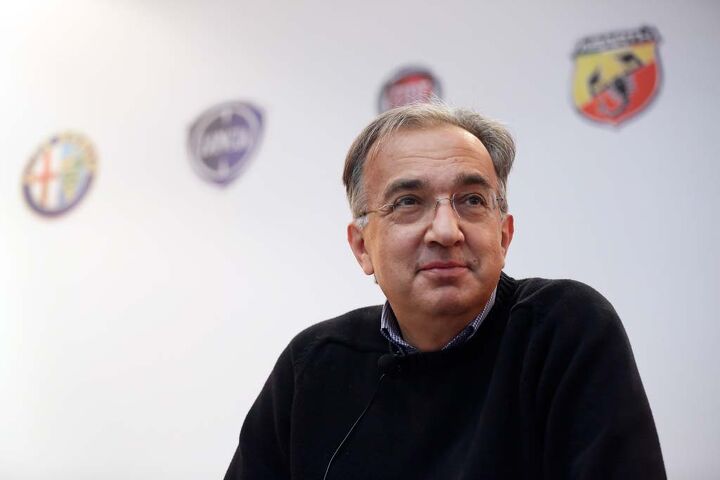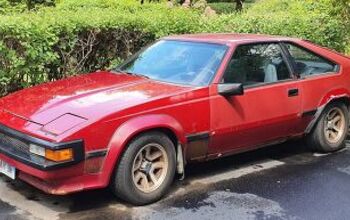Sergio CONFIRMED as Trump's 'Favorite' Auto Exec, Hackett and Barra DESTROYED

Ten automotive executives met with President Donald Trump this week, hoping to find ways to increase domestic production and mitigate the coming changes to corporate fuel economy regulations. The meeting, held in the White House’s Roosevelt Room, included General Motors’ Mary Barra, Ford’s Jim Hackett and Fiat Chrysler’s Sergio Marchionne. While a large portion of the event was spent discussing the administration’s attempt to roll back established fuel economy rules, Trump was focused on returning manufacturing jobs to the United States.
The president noted that FCA’s decision to spend $1 billion in order to expand truck assembly in Michigan made Marchionne more appealing than his contemporaries. “Right now, he is my favorite person in the room,” Trump said.
Presumably, Barra and Hackett were only slightly injured by the president’s endorsement. Sergio is probably a lot of people’s favorite, and his Italian swagger and charming candidness are totally undeniable. Think about which of those three you’d want to talk about cars with over drinks if you have any doubts.
However, Trump’s praise wasn’t the result of Marchionne being a far cooler customer than his square peers. It was because FCA is taking truck production out of Mexico and putting it back into the U.S. Earlier this year, Fiat Chrysler announced it would invest over $1 billion to update and expand the company’s Warren Truck Plant in Michigan. Expected to create around 2,500 American jobs, the deal would move heavy duty Ram production out of Mexico by 2020.
The facility will also build the Jeep Wagoneer and Grand Wagoneer, with Ram 1500 production shifting fully to Sterling Heights. Jeep assembly stands to see investment, with cash going toward production of the new Jeep Wrangler pickup in Toledo, Ohio. The decision has made Sergio fairly popular in the Midwest.
Following FCA’s January investment announcement, Macomb County executive Mark Hackel said the area was “extremely grateful for FCA and Sergio making that commitment … I can’t wait to give him a big hug at the auto show.”
Mexico’s Saltillo truck assembly plant will soon be repurposed to produce vehicles for global markets. Quoted by Reuters, Marchionne reiterated that plan before his meeting with the president. “I think we have to redirect the Mexican production to a global market,” he said. “I think there are things we can do but it’s part of a longer-term plan.”
Sergio also said he agreed with the White House’s efforts to revise vehicle fuel-efficiency rules to account for the growing popularity of larger vehicles. He hoped for an “agreed way forward” on the matter, likely referencing the issue with California, and claimed to support most of the U.S. proposals for automotive rules under the North American Free Trade Agreement.
NAFTA wasn’t the primary topic of the meeting, however — fuel was. The general agreement among automakers, according to the Detroit Free Press, was that they were in favor of softer fueling standards. However, nobody seemed interested in fighting with California and allied states who want to maintain Obama-era standards. Carmakers said they would prefer a cohesive national standard, if possible.
[Image: FCA]

A staunch consumer advocate tracking industry trends and regulation. Before joining TTAC, Matt spent a decade working for marketing and research firms based in NYC. Clients included several of the world’s largest automakers, global tire brands, and aftermarket part suppliers. Dissatisfied with the corporate world and resentful of having to wear suits everyday, he pivoted to writing about cars. Since then, that man has become an ardent supporter of the right-to-repair movement, been interviewed on the auto industry by national radio broadcasts, driven more rental cars than anyone ever should, participated in amateur rallying events, and received the requisite minimum training as sanctioned by the SCCA. Handy with a wrench, Matt grew up surrounded by Detroit auto workers and managed to get a pizza delivery job before he was legally eligible. He later found himself driving box trucks through Manhattan, guaranteeing future sympathy for actual truckers. He continues to conduct research pertaining to the automotive sector as an independent contractor and has since moved back to his native Michigan, closer to where the cars are born. A contrarian, Matt claims to prefer understeer — stating that front and all-wheel drive vehicles cater best to his driving style.
More by Matt Posky
Latest Car Reviews
Read moreLatest Product Reviews
Read moreRecent Comments
- Jeff Self driving cars are not ready for prime time.
- Lichtronamo Watch as the non-us based automakers shift more production to Mexico in the future.
- 28-Cars-Later " Electrek recently dug around in Tesla’s online parts catalog and found that the windshield costs a whopping $1,900 to replace.To be fair, that’s around what a Mercedes S-Class or Rivian windshield costs, but the Tesla’s glass is unique because of its shape. It’s also worth noting that most insurance plans have glass replacement options that can make the repair a low- or zero-cost issue. "Now I understand why my insurance is so high despite no claims for years and about 7,500 annual miles between three cars.
- AMcA My theory is that that when the Big 3 gave away the store to the UAW in the last contract, there was a side deal in which the UAW promised to go after the non-organized transplant plants. Even the UAW understands that if the wage differential gets too high it's gonna kill the golden goose.
- MKizzy Why else does range matter? Because in the EV advocate's dream scenario of a post-ICE future, the average multi-car household will find itself with more EVs in their garages and driveways than places to plug them in or the capacity to charge then all at once without significant electrical upgrades. Unless each vehicle has enough range to allow for multiple days without plugging in, fighting over charging access in multi-EV households will be right up there with finances for causes of domestic strife.


































Comments
Join the conversation
Yesterday: TTAC readers hate Sergio. "Can't get anyone to buy his failed car company, makes crap products, stupid furriner, yadda yadda yadda." Beat. TTAC reports that Trump says he likes Sergio. Today: TTAC readers love Sergio. "Smartest guy in the auto business, great product line, would have a beer with him, MAGA." Ridiculous.
Trumpti Dumpti.